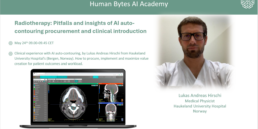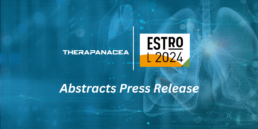The prediction of radiotherapy side effects using explainable AI
Breast cancer is the most occurring cancer worldwide [1]. One of the main treatments for this type of cancer is radiotherapy – but some side effects linked to the irradiation of healthy tissue can appear. The occurrence of these side effects, and how they are linked to the irradiation of one tissue or another, can be hard to predict.
How can we help?
Using its expertise in AI-automated standardized organ segmentation, TheraPanacea will help set common guidelines for the contouring of several thousand breast cancer patients’ scanner images. The contours generated will allow development and training of algorithms for toxicity prediction in breast cancer. The models will be applied to the prediction of arm lymphoedema, which is among the most common and measurable side effects [2]. The impact will be tested in an interventional clinical randomized controlled phase III trial, to determine relevance in supporting decisions regarding irradiation of organs and structures close to the arm (e.g. lymphatic and blood vessels).
Promising expectations and benefits
The results are expected to bring the field one step closer to personalized radiotherapy, as well as to facilitate evidence-based decision making for clinicians and patients.
Future benefits might include: (i) giving suitable patients hypo fractionated radiotherapy with a reduced number of larger doses, which could lead to reduced side-effects and less time needed from patients; (ii) treating early stage breast tumors with partial breast irradiation in patients at high-risk for side effects; (iii) advising selected patients whether to have a mastectomy (thus avoiding radiotherapy) or a reduction mammoplasty prior to radiotherapy; and (iv) deciding whether to use conventional photon radiotherapy or proton therapy.
Our partners
TheraPanacea is honored to contribute to this project with unique and renowned partners: University of Leicester, Athens University of Economics and Business, Maastro, Unicancer, Italian National Research council, HES-SO Haute école spécialisée de Suisse occidentale, Gustave Roussy, CENTAI & Medical Data Works.

[1] World Health Organization website: https://www.who.int/news-room/fact-sheets/detail/breast-cancer
[2] Allam O, Park KE, Chandler L, et al. The impact of radiation on lymphedema: a review of the literature. Gland Surg. 2020;9(2):596-602. doi:10.21037/gs.2020.03.20
Related Posts
25 June 2024
Unlocking the Potential of AI Auto-Contouring in Radiotherapy at HELSE Bergen [WEBINAR]
Clinically Relevant AI in Radiation…
24 October 2023
Innovations in Radiation Oncology: Harnessing AI for better patients outcomes [WEBINAR]
Clinically Relevant AI in Radiation…




